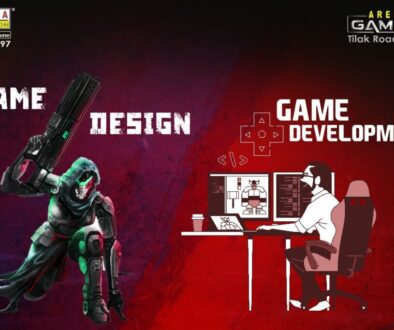Game Designing Courses After 12th
A video game’s or any other interactive experience’s rules, mechanics, and general structure are created through a process known as game design. It includes creating the gameplay, level design, character development, plot, art direction, sound design, and other components that enhance the player experience as a whole.
To become a game designer, here are some steps you can take:
Acquire knowledge: Learn about the many facets of game creation to start. Study the philosophy, mechanics, and storytelling of game design via books, papers, and blogs. To learn from seasoned game designers, take part in online forums, watch tutorials, and go to workshops. Develop skills: Develop your abilities by honing those that are pertinent to game creation. These might involve project management, writing, level design, programming, 2D or 3D art, and narrative. Focus on acquiring a few crucial skills that are compatible with your intended position as a game designer, depending on your hobbies and areas of strength. Create your own games: Start creating your own games or interactive experiences to put everything you’ve learned to use and to show off your skills. Start with simple tasks and progress to bigger, more complicated games over time. This will not only enable you to hone your abilities but also provide you with a portfolio to show prospective employers or partners your work. Collaborate with others: It’s advantageous to collaborate with other game designers, programmers, artists, and sound designers because game creation is frequently a collaborative effort. Join groups for game developers, go to conferences or meetings, and look for chances to work on projects together. Your ability to work well with people will increase as a result of collaborative experiences that will help you comprehend the many responsibilities that make up a development team. Obtain a relevant education: While not strictly necessary, pursuing a degree or taking courses in game design related to fields can provide you with a solid foundation and expose you to valuable industry knowledge. Several institutes and online platforms offer game design programs or courses. Build a network: In the gaming sector, networking is essential. Attend conferences, game jams, and industry events to network with other experts and get insight into their experiences. Engage with game creators, designers, and enthusiasts through social media platforms and forums by taking part in online communities. Gain experience: Look for internships, entry-level jobs, or freelance work in the gaming sector. You may hone your abilities even further, learn more useful information, and expand your professional network by working on real-world projects and collaborating with seasoned experts.Remember, becoming a game designer is a continuous learning process.
What does a game designer do?
A video game or other interactive experience’s rules, mechanics, and general structure are created by a game designer. In order to improve the player experience, they are responsible for developing gameplay, level layouts, character development, stories, art style, sound, and other components. The following are some of the main duties of a game designer:-
Game Conceptualization
-
Game Mechanics Design
-
Level Design
-
Storytelling and Narrative Design
-
Game Balancing and Iteration
-
Collaboration
-
Documentation
-
User Experience (UX) Design
-
Playtesting and Feedback Incorporation
How much does a game designer make?
The salary of a game designer can vary based on factors such as experience, location, company size, and the specific role and responsibilities within game design. Additionally, the game industry can also offer other forms of compensation, such as bonuses, profit sharing, stock options, or additional benefits, depending on the company and the success of the game being developed. Salaries in the game industry can also be influenced by the success of the company and the specific project being worked on.Is Game Design a Good Career Choice?
The Growing Demand: Over time, the video game business has grown rapidly, and there are no indicators that this trend will reverse. Technology improvements have increased the requirement for talented game designers. There are several options for skilled people to display their creativity and technical prowess, from independent studios to significant game production firms. Creative Expression: A special fusion of creativity and technology exists in game creation. It gives creators the freedom to express their ideas by creating engrossing characters, gorgeous locations, and fun gaming elements. Creating immersive experiences that immerse players in new worlds may be incredibly gratifying for people who are passionate about visual design and narrative. Collaboration and Teamwork: Collaboration amongst a variety of experts, including artists, programmers, sound designers, and writers, is a key component of game creation. Working in teams with people from different backgrounds creates a dynamic environment where ideas may grow. Constant Learning and Innovation: Collaboration amongst a variety of experts, including artists, programmers, sound designers, and writers, is a key component of game creation. Working in teams with people from different backgrounds creates a dynamic environment where ideas may grow. Challenges and Competitive Nature: Even while a job in game creation may be exciting and gratifying, it’s crucial to recognize its difficulties. The market is fiercely competitive, and being well-known may demand commitment, tenacity, and a potent resume. It can be tough to work long hours, fulfill deadlines, and live up to player expectations. However, these difficulties may be viewed as chances for improvement and self-improvement by individuals who have a genuine enthusiasm for video games.Game Development tools?
-
Unity
-
Unreal Engine
-
Godot Engine
-
GameMaker Studio
-
Construct
-
Cocos2d
-
RPG Maker
-
Corona SDK



